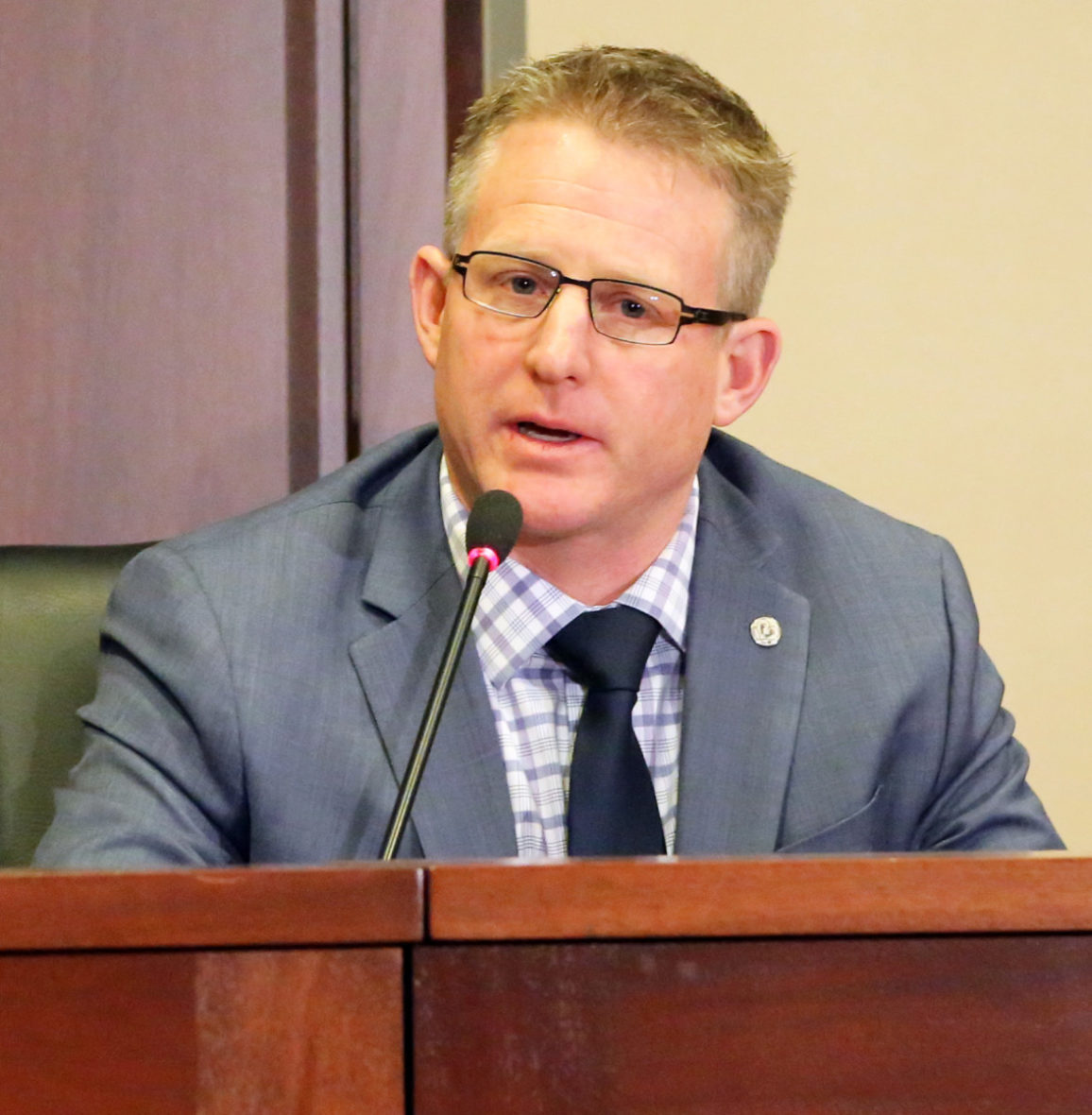As the national debate over school safety intensifies, the 2018 Idaho Legislature has done nothing to address the issue, House Minority Leader Mat Erpelding said Tuesday.
But the issue is complex, and not given to simple answers, Senate President Pro Tem Brent Hill said.
“It’s not just gun violence,” said Hill, R-Rexburg. “It’s suicide. It’s bullying. It’s lack of respect for educators.”
Erpelding, Hill and other legislative leaders spent an hour fielding questions at an Idaho Press Club luncheon Tuesday — discussing everything from taxes to timetable for wrapping up the 2018 session. But the school safety discussion came one day before students in Idaho and across the country are planning walkouts to protest congressional inaction on gun violence. It also comes one day after state superintendent Sherri Ybarra floated a $20.8 million plan to address school safety in Idaho.
Ybarra will not pursue her school safety plan in the waning days of the 2018 session. And on the legislative front, a few bills have emerged. After considerable debate Friday, the House passed a bill addressing school threats made over social media or in chat rooms. A bill requiring baseline suicide training for school employees is headed to the Senate floor. A bill allowing retired law enforcement officers to carry concealed weapons in schools is headed to Gov. Butch Otter’s desk.

But Erpelding, D-Boise, said the Legislature’s efforts have come up short.
“We have got to start having a conversation about background checks and tying it back to mental health records,” he said.
Hill said background checks could make sense, under some circumstances, and he said the state could do more to address mental health issues. But Hill also said the role of the family is often overlooked in the debate over school safety.
Hill’s Democratic counterpart in the Senate couched the issue in terms of fiscal priorities. While the 2018 Legislature has passed an income tax cut, the state hasn’t addressed Medicaid expansion or backfilled its Department of Health and Welfare budgets, said Senate Minority Leader Michelle Stennett, D-Ketchum.
“If we’re talking about flagging this in the schools, we need to have a better presence in there,” she said.
The reading test: the ‘going-home bill?’
As legislators hope to wrap up their work for 2018, the impasse over Idaho’s reading test could be more than a minor speed bump.
It could be a “going-home bill:” Statehouse shorthand for legislation that is a linchpin to adjournment.

Otter is adamant about breaking the impasse, House Speaker Scott Bedke said during the Idaho Press Club’s luncheon. But there is no compromise in hand.
“There’s some talking past each other,” said Bedke, R-Oakley.
In late February, legislative budget-writers cut a $100,000 line item for a pilot test to replace the Idaho Reading Indicator, a short test to identify kindergarten through third-graders who are not reading at grade level. The Joint Finance-Appropriations Committee also ordered Ybarra to stop work on a new contract for a reading test.
Some key legislators say it is premature to commit to the new test — piloted by Istation, a Dallas vendor. And as Idaho Education News reported last week, some key lawmakers aren’t sold on the need for a statewide assessment.
That’s the rub. Bedke said he would prefer a statewide assessment, as opposed to multiple tests selected at the local level.
Otter isn’t tipping his hand — for now. “Let me follow back up with you tomorrow,” spokesman Jon Hanian said Tuesday. “We will know a bit more then.”
Indeed, the issue could come into a bit more focus early Wednesday morning. When the House Education Committee meets at 8 a.m., Chairwoman Julie VanOrden will present a bill that, according to the committee agenda, addresses “reading intervention.” VanOrden did not immediately respond to a request for comment.
The clock is ticking. Lawmakers hope to finish their work by March 23. A bill on the reading test would need to navigate both houses in short order. And if the state wants to put money into a reading test — administered by Istation or anyone else — JFAC would need to follow up with a spending bill.
Bedke would like to help the House and the Senate find a compromise, but he suggested that might not be enough.
“It would be nice if the governor didn’t veto it,” he said.
Charter bill to get a rewrite
A bill to allow charter schools flexibility in hiring administrators will get some late-session rewrite.
The Senate Education Committee voted along party lines to send House Bill 566 to the floor for amendments.
As written, and as passed in the House, HB 566 would allow charter schools to hire administrators holding a bachelor’s degree. The amendments could add a menu of other requirements; an applicant might need five years’ teaching experience, for example, or five years’ experience in some administrative role.
Several senators seemed reluctant to amend the bill at all, saying they were comfortable with the House version. “I think this bill engenders innovation,” said Sen. Steven Thayn, R-Emmett.
Committee Democrats wanted the bill held in committee.
Testimony was mixed. Charter school advocates said they wanted increased hiring flexibility. The State Board of Education, the Idaho Association of School Administrators and the Idaho Education Association testified against the bill.
If the Senate passes the amended bill, the House would have to vote on it again, to sign off on the Senate’s changes.
Trustee elections bill heads to Otter’s desk
The House signed off on a compromise bill to move school trustee elections from their traditional May date.
Senate Bill 1280 would move the elections to November of odd-numbered years, meaning trustee races would share a ballot with races for mayor and City Council.
For three years, some legislators have been pushing for a change, in an attempt to improve voter turnout. The Idaho School Boards Association had opposed past proposals, which would have placed nonpartisan school board races on the November general election ballot — alongside partisan state and federal elections.
With the House’s 50-18 vote, SB 1280 heads to Otter’s desk.
One tax bill passes House, a second passes the Senate
With very little debate, the House unanimously passed a bill to raise child tax credits for families.
House Bill 675 would create a $205 child tax credit, up from the $130 credit passed earlier this year.
Increasing the tax credit is expected to come at a cost of $25 million to Idaho’s general fund.
House Majority Leader Mike Moyle said passing the bill is essential to shield large families from a tax increase, despite tax cut packages approved by President Trump and Congress and House Bill 463, which Gov. Butch Otter signed into law Monday. HB 463 included the $130 child tax credit.
HB 675 goes to the Senate.
Meanwhile, the Senate passed House Bill 578, which would pave the way for the state to collect additional sales taxes on Internet purchases. Sponsors say the state could collect $22 million to $37 million a year.
With the Senate’s 30-4 vote, HB 578 goes to Otter’s desk.
Idaho Education News reporter Clark Corbin contributed to this report.
